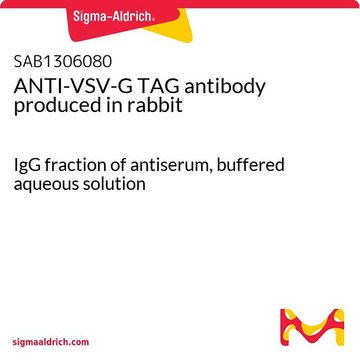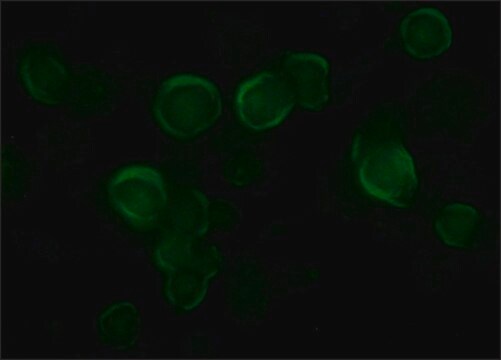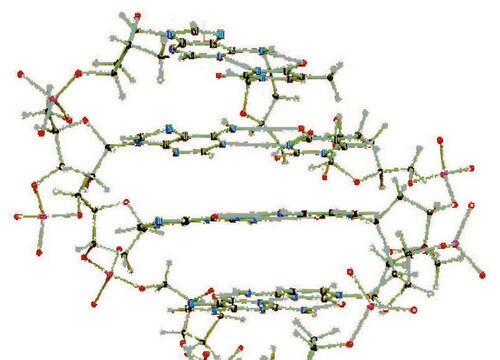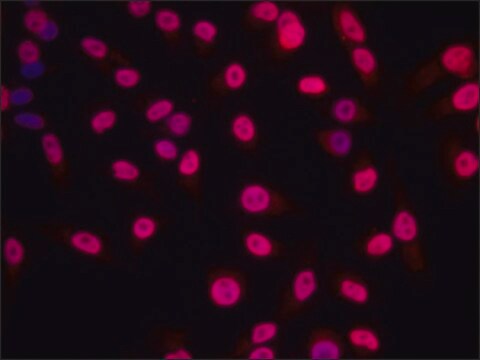추천 제품
생물학적 소스
mouse
Quality Level
결합
CY3 conjugate
항체 형태
purified immunoglobulin
항체 생산 유형
primary antibodies
클론
P5D4, monoclonal
양식
buffered aqueous solution
기술
direct immunofluorescence: 1:10,000 using COS-7 cells transfected with a VSV-G tagged vinculin construct
동형
IgG1
배송 상태
wet ice
저장 온도
2-8°C
타겟 번역 후 변형
unmodified
유사한 제품을 찾으십니까? 방문 제품 비교 안내
일반 설명
Monoclonal Anti-VSV Glycoprotein (mouse IgG1 isotype) is derived from the P5D4 hybridoma produced by the fusion of mouse myeloma cells and splenocytes from a BALB/c mouse immunized with a synthetic peptide of vesicular stomatitis virus glycoprotein (VSV-G), conjugated to keyhole limpet hemocyanin (KLH). VSV-G is a protein expressed on the surface of bullet shaped virions.
특이성
The antibody recognizes an epitope containing the five carboxy-terminal amino acids of VSV Glycoprotein. In infected cells, the antibody localizes the immature forms of VSV-G in the rough endoplasmic reticulum (RER) and in the cisternae of Golgi complex, as well as mature VSV-G at the cell surface and in the budding virus. The antibody does not stain the secreted form of VSV-G which lacks the membrane and the cytoplasmic domain. This antibody has been used for studies on the role of the cytoplasmic domain on newly-synthesized VSV-G during transfer to the plasma membrane and cell surface, using micro-injected antibody, immunoblotting, immunoprecipitation, immunocytochemistry and immunoelectron microscopy. The antibody has been used for the detection, immunoprecipitation and immunocytochemical staining of exogenously introduced constructs tagged with the carboxyl-terminus of VSV-G. This tag does not interfere with the function of the studied protein and can be specifically recognized by the P5D4 antibody without cross-reaction with any endogenous protein.
면역원
synthetic peptide containing the 15 carboxy-terminal amino acids (497-511) of Vesicular Stomatitis Virus Glycoprotein (VSV-G), conjugated to KLH.
애플리케이션
A dilution of 1:1000 of Monoclonal Anti-VSV Glycoprotein-Cy3™ antibody produced in mouse was used to detect VSV glycoprotein in pig sperms by immunofluorescence.
Monoclonal Anti-VSV Glycoprotein Cy3™ antibody produced in mouse has been used:
- in studies applying
- microinjection of antibody
- immunoblotting
- immunoprecipitation
- immunocytochemistry
- immunoelectron microscopy.
생화학적/생리학적 작용
The envelope of vesicular stomatitis virus (VSV) consists of a bilayer membrane with a single type of glycoprotein, the G-protein (VSV-G) which mediates attachment to the cell surface and induces pH-dependent fusion between viral and target membranes. The carboxyl terminus of the VSV-G protein which does not have any homology with cellular proteins, has been engineered into expression vectors as a tag. Proteins expressed with this tag may thus be detected and localized using an antibody reactive specifically against this epitope with no risk of cellular background staining.
The vesicular stomatitis virus (VSV) glycoprotein facilitates the entry of HIV into the CD4 T cells through endocytotic pathway. The coupling of Cy3 to Anti-VSV Glycoprotein antibody allows for the visualization of protein by fluorescent microscopy.
물리적 형태
Solution in 0.01 M phosphate buffered saline, pH 7.4, containing 15 mM sodium azide
법적 정보
Cy is distributed under license from Amersham Biosciences Limited.
Cy3 is a trademark of Cytiva
면책조항
Unless otherwise stated in our catalog or other company documentation accompanying the product(s), our products are intended for research use only and are not to be used for any other purpose, which includes but is not limited to, unauthorized commercial uses, in vitro diagnostic uses, ex vivo or in vivo therapeutic uses or any type of consumption or application to humans or animals.
적합한 제품을 찾을 수 없으신가요?
당사의 제품 선택기 도구.을(를) 시도해 보세요.
Storage Class Code
10 - Combustible liquids
WGK
nwg
Flash Point (°F)
Not applicable
Flash Point (°C)
Not applicable
개인 보호 장비
Eyeshields, Gloves, multi-purpose combination respirator cartridge (US)
Long-term, targeted genetic modification of the aqueous humor outflow tract coupled with noninvasive imaging of gene expression in vivo
Loewen N, et al.
Investigative Ophthalmology & Visual Science, 45(9), 3091-3098 (2004)
Nils Loewen et al.
Investigative ophthalmology & visual science, 45(9), 3091-3098 (2004-08-25)
To address a problem impeding research into glaucoma-associated genetic mutations and glaucoma gene therapy and achieve permanent, targeted transgene expression in the trabecular meshwork (TM). Lentiviral vectors are known to transduce human donor eye TM ex vivo, but efficacy in
Satoshi Aoki et al.
Nephrology, dialysis, transplantation : official publication of the European Dialysis and Transplant Association - European Renal Association, 33(1), 26-33 (2017-10-11)
Heparan sulphate proteoglycan (HSPG) is present in the glomerular basement membrane (GBM) and is thought to play a major role in the glomerular charge barrier. Reductions and structural alterations of HSPG are observed in different types of kidney diseases accompanied
Laura Miesen et al.
Disease models & mechanisms, 15(3) (2021-12-21)
In the glomerulus, Bowman's space is formed by a continuum of glomerular epithelial cells. In focal segmental glomerulosclerosis (FSGS), glomeruli show segmental scarring, a result of activated parietal epithelial cells (PECs) invading the glomerular tuft. The segmental scars interrupt the
Mechanism of membrane fusion induced by vesicular stomatitis virus G protein
Kim IS, et al.
Proceedings of the National Academy of Sciences of the USA, 114(1), E28-E36 (2017)
자사의 과학자팀은 생명 과학, 재료 과학, 화학 합성, 크로마토그래피, 분석 및 기타 많은 영역을 포함한 모든 과학 분야에 경험이 있습니다..
고객지원팀으로 연락바랍니다.







